国际交流英语视听说第4册unit2
视听说第四册Unit2
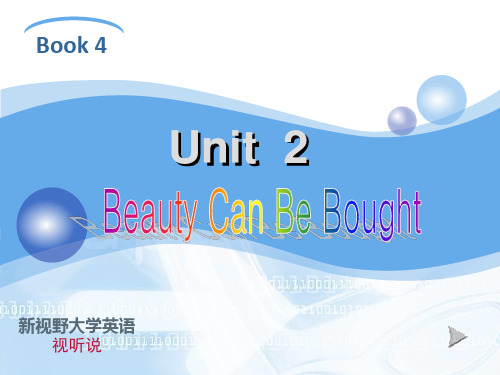
Book 4 Unit 2
Task 3 Plastic Surgeries for Men
Listening strategy: To understand the main idea: listen carefully to the first sentence . To grasp the important details: decide what the kind of information we want. If we are listening to a story, we need to sharpen our ears for the when and where, the what and how and why something happened. In listening to a statistic report, what we should watch out for are the aspect mentioned, the verbs like „leap, leaped, rise, rose, fall, fell, drop, dropped‟, the figures and percentage, and the time signals like „previous year‟ which means the year before the last in task 3. NHCE Viewing, Listening & Speaking
Book 4 Unit 2
The Voice Lift
Compound Dictation Exercise
(S8)_________________________________________
国际交流英语视听说B4U2
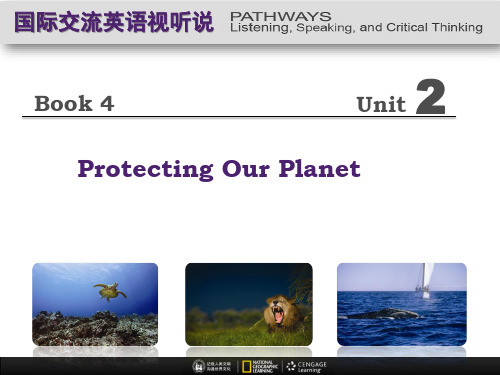
Exploring the Theme
Protecting Our Planet
1. Lions and other types of big cats are dying at a rapid rate. What do you think is the biggest threat to these animals?
Think and Discuss
Questions
2. What are some reasons that animals become extinct?
Example Answers Species can become extinct due to over-hunting or overfishing , climate change, loss of habitat, or competition from invasive species.
Exploring the Theme
Protecting Our Planet
2. If a plant species becomes extinct, what effect does this have on the environment?
Example Answers
If a plant species becomes extinct, then any insect species or animal that depends on it could go without food and shelter. In addition, plants are important to the soil and the air, so losing a plant species could have several negative effects on the environment.
国际交流英语视听说B1U4 全图文
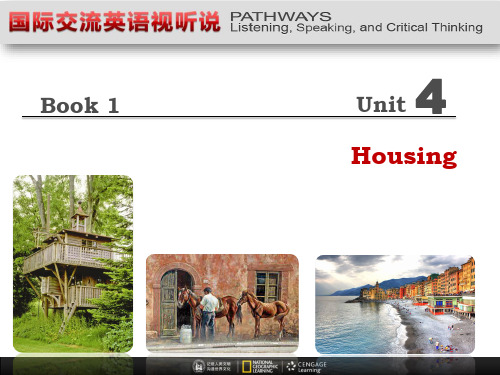
Housing
1. Where was each photo taken? Example Answers
These photos were taken in Canada, the United States, Australia (Melbourand), and the United Arab Emirates (Dubai).
Housing
Think and Discuss
Think and Discuss
Questions
1. What do you see in the photo?
2. Would you like to live in a house like this? Why or why not? 3. What do you think you will learn about in this unit?
Exploring the Theme
Example Answers
Advantages
House Row House Apartment Building Condominium
Housing
3. What are some of the advantages and disadvantages of each type of housing?
Tall apartment buildings are common in the world’s large cities. These apartment buildings are in Melbourne, Australia. An “apartment complex” is several of these buildings together.
we learn 全新版大学进阶英语视听说教程4答案(最全最新)第二单元
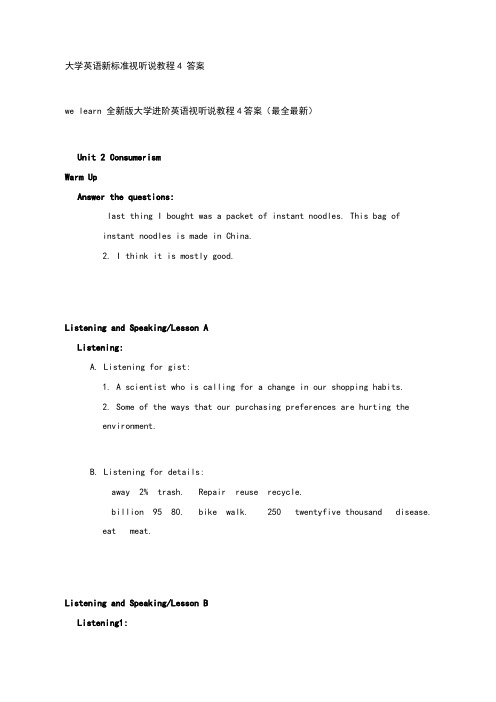
大学英语新标准视听说教程4 答案we learn 全新版大学进阶英语视听说教程4答案(最全最新)Unit 2 ConsumerismWarm UpAnswer the questions:last thing I bought was a packet of instant noodles. This bag ofinstant noodles is made in China.2. I think it is mostly good.Listening and Speaking/Lesson AListening:A. Listening for gist:1. A scientist who is calling for a change in our shopping habits.2. Some of the ways that our purchasing preferences are hurting theenvironment.B. Listening for details:away 2% trash. Repair reuse recycle.billion 95 80. bike walk. 250 twentyfive thousand disease.eat meat.Listening and Speaking/Lesson BListening1:A. New words andexxxxxpressions:B. Pre-listening task:C. Listening comprehension1:our stuff comes from.of the products we buy are made or grown somewhere else.C. Listening comprehension2:statistics designed electronics resources African diamondsListening2:A. Listening for gist: 一二四B. Listening for details:twelve fires a dollar% millionVideoBefore You WatchAbout the video:Vocabulary matching: Global warming fossil fuels greenhouse gases carbon footprintWhile You Watch:A. Watch the video:左:water water右:waste cold transportB. Watch again: e g b 进行中C. Answer the following question:Eating cheeseburgers affects the environment in many ways. First youhave to feed the cows. You need a lot of water to grow the food for them.Then you need wheat to make the bread that the hamburger goes on. Thatneeds water too. Once you have the beef you have to transport the meatfrom one place to another. You also have to keep it cold. To do all ofthese things you need a lot of energy. And this produces a lot of CO2.And carbon dioxide isn’t the only greenhouse gas that’s created. Cowsalso produce another greenhouse gas called methane when they make waste.And cows create a lot of waste. When you add it all up the result is avery big number.Unit test*Part 1Section A; ; ; ; ; ; ; ; ;Section B3 54 2 1Part 2CET-Oriented StudyListening practice: 1. A 2. D 3. C。
国际交流英语视听说4U4听力原文总结及翻译
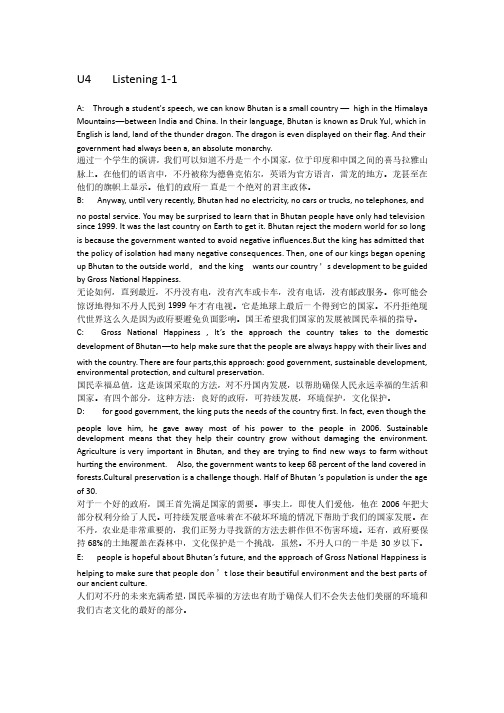
A: Through a student's speech, we can know Bhutan is a small country — high in the Himalaya Mountains —between India and China. In their language, Bhutan is known as Druk Yul, which in English is land, land of the thunder dragon. The dragon is even displayed on their flag. And their government had always been a, an absolute monarchy.通过一个学生的演讲,我们可以知道不丹是一个小国家,位于印度和中国之间的喜马拉雅山脉上。
在他们的语言中,不丹被称为德鲁克佑尔,英语为官方语言,雷龙的地方。
龙甚至在他们的旗帜上显示。
他们的政府一直是一个绝对的君主政体。
他们的旗帜上显示。
他们的政府一直是一个绝对的君主政体。
B:Anyway, un l very recently, Bhutan had no electricity, no cars or trucks, no telephones, and no postal service. You may be surprised to learn that in Bhutan people have only had television since 1999. It was the last country on Earth to get it. Bhutan reject the modern world for so long is because the government wanted to avoid nega ve influences.But the king has admi ed that the policy of isola on had many nega ve consequences. Then, one of our kings began opening up Bhutan to the outside world ,and the king wants our country ’s development to be guided by Gross Na onal Happiness.无论如何,直到最近,不丹没有电,没有汽车或卡车,没有电话,没有邮政服务。
新世纪大学英语系列教材视听说教程4unit2

Lesson A Computers are everywhere. Lesson B Modern technology
Listening Activity 2 Hi-tech toys
Language Notes
Proper names
Finland
Henrik
Juliana
Lynn
Ollie
An English Video Course 4 视听说教程(第三版)电子教案 4
Unit 2 Technology Today
Lesson A Computers are everywhere. Lesson B Modern technology
Vocabulary Link CInomthpeunteerigwhobrodrshood
当代世界经济与政治第二章当代世界经济与政治第二章当代世界经济与政治第二章
Unit 1 Our Earth Unit 2 Technology Today Unit 3 Newspapers and the News Unit 4 The World of Work Unit 5 Big Business Unit 6 Wealth Unit 7 Social Issues Unit 8 Honestly Speaking
_l_ig_h_t____________
__h_e_at_e_r__________
_a_i_r _c_o_n_d_it_io_n_e_r____
_r_e_fr_i_g_er_a_t_o_r ______
_t_e_le_p_h_o_n_e________
Lesson A Computers are everywhere. Lesson B Modern technology
21世纪大学英语视听说教程Book4Unit2PartD听力原文

Book 4 Unit 2 Part D 听力原文Section A1. M: Good morning, Madam, could you tell me how old you are?W: Well, I don’t remember, doctor, but I will try to think. When I married, I was eighteen years old, and my husband was thirty. Now, my husband is seventy, I know.Q: How old is the lady?2. W: Hey, have you heard about this? The film star, Janice, was followed by paparazzi all the time. Isn’t it terrible?M: Everyone’s got a right to some privacy, but if you want to be famous, you have to accept the press and the media.Q: What does the man mean?3. W: How did you like the president’s speech tonight?M: Unfortunately I got home too late to watch it.Q: What are the two speakers talking about?4. W: I’ve noticed that you haven’t been talking to your roommate lately.M: It is supposed to be private, but you’ve got that right. And it’ s g oing to be a long time before I feel comfortable with him again.Q: What does the man mean?5. W: So, what did you think about the discussion at lunch? I didn’t realize people have such strong feelings about privacy.M: Are you kidding? That subject always touches a nerve.Q: What does the man mean?6. M: So, you and Julia are no longer roommates. I’m not surprised. Y ou two never did things very compatible.W: Yeah. Well, it’s not that we didn’t get along. We just didn’t have much in common.Q: What can be inferred about the woman?7. W: So how did you make out with your private German lessons last month? Any improvement? M: Let’s just say it was money down the drain.Q: What does the man mean?8. M: I can’t seem to find my calculator. Did I lend it to you by any chance?W: No, but you are welcome to use mine if you want, as long as I get it back by Thursday.Q: What does the woman mean?Conversation 1M: Good morning, Professor Harkens. I hope I am not disturbing you.W: Not at all, Tom. Come right in. I’m always in my office in the morning.M: I thought I’d get an early start on my research paper and would like to discuss my topic withyou if you have a moment.W: Of course. I recommend that all my students should discuss their topics with me before they begin their research. What do you want to work on?M: I was especially interested in your lecture on dinosaurs and the apparent mystery surrounding their extinction. I’d like to explore that question, but I’m not too sure how to go about it.W: Well, according to the most widely held theory, the dinosaurs died out because of the sudden cooling of the earth’s temperature. Y our textbook summarizes the conclusion of several paleontologists on this point.M: Didn’t you also mention a second theory in your lecture? That dinosaurs may simply have been replaced by mammals gradually and might not die out as a direct response to the cool weather?W: Y es. V an V ellen and Sloan are proponents of this theory. And I’ve put some of their articles on reserve in the library.M: V an V ellen and Sloan? I’d better write that down.W: Let me know how your work progresses, Tom. If you should run into any problems, be sure to stop by again.9. Who are the two speakers?10. What is the main focus of Tom’s research?11. Who most likely are V an V ellen and Sloan?Conversation 2W: Hew! This rowing is hard work. Let’s have the boat toward the old lighthouse now.M: Good idea. We can rest there for a while and eat our lunch. Then we can climb to the top platform where the light is before we visit the museum at the base of the lighthouse tower.W: Whenever I came out here, I thought about the family who used to live on the little island and take care of the light every night. What a lonely life that must have been!M: Y eah, to help ships find their way along shoreline, at night, they had to constantly make sure that the windows up around the light were clean and free of ice and snow.W: Dirty soot must have be en a problem. Didn’t they burn candles up there?M: This one used to have a kerosene lamp. But they changed over to electricity around 1920, I think.W: In New Port, Rode Island, people talked about a woman who was a lighthouse keeper for over 50 years. Ida Louise was her name. She saved a lot of people from dying in ship wrecks.M: Was her lighthouse out on an island like this one?W: On one even smaller and further from land. In stormy weathers, it was pretty dangerous for small boats.M: I understand the United States Coast Guard takes care of the most modern lighthouses.W: Y eah, but the light is automatic nowadays. The lighthouse is still a friendly sight at night though.M: Here we are. This lighthouse is the friendliest sight I’ve seen today. I’m exha usted.12. What are the people doing?13. What was a major problem for every lighthouse keeper?14. Why was Ida Louise famous?15. How does the man feel at the end of the conversation?Section BPassage 1More and more electronic devices and services in our daily life mean we have too many passwords and numbers to remember. Passwords help us protect our wealth and privacy; however, they also bring us a lot of troubles.Every day I need to remember much useless information. Every morning I turn on my cellphone — it needs a password. I get to work and I have to have access to my computer with a password. Like many people in Britain, I have two bank accounts. One needs a five-digit number and a password; the other needs a six-digit number and a memorable place name. I have an online savings account that needs a different password from the password for my bank account.Even if you never use a computer, you can be hit by the password overload. Look in your wallet. Y ou probably carry four or five credit cards. In these days of chip and pin, these are virtually useless if you do not have the magic four-digit numbers. The banks tell you not to have the same number for all your cards. Give me a break. Am I going to carry five different random four-digit numbers in my head? After all, I’m not Good Will Hunting.I’ve tried systems to help me remember —such as using the names of favorite films or members of my extended family; but none seems to work. So what is the solution?16. What do passwords bring to us?17. Which of the following does NOT need a password?18. What has the speaker tried to do to remember his passwords?Passage 2Internet is threatening our privacy. In the past, if a shop manager wanted to know you better, he had to rely on a good memory for detail. They came out from behind the counter to give you personalized service, browsed the shelves with you and made recommendations.In this digital marketplace, the “shop manager” may actually be a machine. It searches in its memory of information about you, analyzes it and creates a clear portrait of what you are likely to buy and do in the future. Not all companies approach personalization in the same way. For some websites, the approach is direct: they ask you to take a survey about what you like, and then make offers that match your interests. Another way is through IP addresses, the electronic place from which you browse the Web. and many other sites also compare individual’s browsing and buying habits to those of thousands and millions of other consumers in their databases. Using a technique called collaborative filtering, they can find out your likely interests. This is based on what they know about what like-minded people buy or do.But this new use of Internet begins to trouble some computer users. They worry that advertisers can track their private information without their knowledge, and that files about them might be put to ill use somehow, or shared with wrong people. Sometimes they just don’t like being watched.19. Which of the following do traditional shop managers NOT do to know their customers?20. In the digital market, which of the following does the “shop manager” NOT do?21. How does know about its customers?22. Which of the following troubles some computer users?Passage 3Every day you share personal information about yourself with others. It’s so routine that you may not even realize you’re doing it. Y ou may write a check at the grocery store, charge tickets to a ball game, rent a car, mail your tax returns, buy a gift online, call home on your cell phone, schedule a doctor’s appointment, or apply for a credit card. Each transaction requires you to share personal information: your bank and credit card account numbers; your income; your Social Security Number (SSN); or your name, address, and phone numbers.It’s important to find out what happens to the personal information you and your children provide to companies, marketers, and government agencies. These organizations may use your information simply to process your order; to tell you about products, services, or promotions; or to share with others.And then there are unscrupulous individuals, like identity thieves, who want your information to commit fraud. Identity theft — the fastest-growing white-collar crime in America —occurs when someone steals your personal identifying information, like your SSN, birth date, or mother’s maiden name, to open new charge accounts, order merchandise, or borrow money. Consumers targeted by identity thieves usually don’t know they’ve been victimized. But when the fraudsters fail to pay the bills or repay the loans, collection agencies begin pursuing the consumers to cover debts they didn’t even know they had.23. In which of these actions may people NOT reveal their private information?24. What may organizations use your private information to do?25. When will the consumers notice that their private information was stolen?Section C26. launched27. previously28. critical29. seminars30. genetic31. collaboration32. perform33. accusing him of34. added a clause to35. walk out。
国际交流英语视听说4U4听力原文及翻译

国际交流英语视听说4U4听力原文及翻译***U 2 Listening 1A Student PresentationTeacher: OK, class, let’s get started with the first presentation. Sompel has prepared a short presentation about his home country of Bhutan. Go ahead, Sompel.Sompel: Thanks. Um, hi, everybody! You know that my name is Sompel, but you may not know that I ’m from Bhutan. Bhutan is a small country ― high in the Himalaya Mountains ― between Indiaand China. In our language, Bhutan is known as Druk Yul, which in English is land, land of the thunder dragon. The dragon is even displayed on our flag. For many years, my country was isolated from the world, partly due to its geography ― it ’s surrounded by high mountains ― but also because of government policies.Our government had always been a, an absolute monarchy, I mean,government headed by aking with unlimited power. Anyway, until very recently, Bhutan had no electricity, no cars or trucks, no telephones, and no postal service. You may be surprised to learn that in Bhutan people have only had television since 1999. It was the last country on Earth to get it. You may be wondering: Why did Bhutan reject the modern world for so long? Well, the government wastrying to protect the people fromnegative influences such as highcrime rates, youth violence, and pollution. But the king has admitted that the policy of isolation had many negative consequences. For example, the education system definitely fell behind. Some people never learned to read and write. Then, one of our kings began opening up Bhutan to the outside world, and our current king has continued the process. There are new roads, schools, and health clinics. The king doesn ’t want to open up the country all at once to the outside worl d and risk ruining it. He wants our country ’s development to be guided by, now let me think, oh, yes, Gross National Happiness.Teacher: Sompel, sorry to interrupt, before you continue, could you define Gross National Happiness for the class, please?Sompel: Um, sure. How should I put it? Well, you ’ve probably heard of Gross National Product, which is a phrase that refers to the dollar value ofall the goods and services produced by a countryover a period of time. It’s one way of measuring a country ’s success. But Gross National Happiness is different. Actually, one of our kings invented the phrase Gross National Happiness. It’s the approach the country takes tothe domestic development of Bhutan― to help make surethat the people are always happy with their lives and with the country. There are four parts, um, four “pillars”, to this approach: good government, sustainable development, environmental protection, and cultural preservation. So, for good government, the king puts the needs of the country first. In fact, even though the people love him, he gave away most of his power to the peoplein 2021.That’ s when the country transitioned to democracy. The king still has an important role, but he no longer has absolute power. Real power belongs to the people and the officials that we elect. Sustainable development means that we help our country grow without damaging the environment. And the pillar of environmental protection is closely related to sustainable development, too. Agriculture is veryimportant in Bhutan, and we are trying to find new ways to farm without hurting the******environment.Also, the government wants to keep 68 percent of the land covered in forests. Cultural preservation ― the last pillar― is a challenge though.Half of Bhutan ’s population is in their twenties or younger, and the government anticipates that some young people will get involved with gangs, crime, or drugs, for example. The government has banned television channelsthat they think are harmful. Even so, youth gangs are growing. Theft, whichwas not very common before, is also rising. On the other hand, there is a positive side to all of the changes. In a mountainous country such as Bhutan, communicationtechnologies ― for instance, mobilephones and the Internet ― allow people to communicate more easily than ever before. And it seems that the arts are really moving ahead. Twenty years ago Bhutan had never produced a movie, but these days we produce over 20 a year. And some movies have even displayed the difficulties that Bhutan has had with the challenges of the modern world. These types of movies are important. They can help us explore the contradictions that have come with our changing culture.Teacher: Sompel, ho w do you view Bhutan ’s future?Sompel: Well I ’m hopeful about Bhutan ’s future, and I ’m glad that the approach of Gross National Happiness is helping to make sure that wedon ’t lose our beautiful environment and the best parts of our ancient culture.Sompel: Um, sure. How should I put it? Well, you ’ve probably heard of Gross National Product, which is a phrase that refers to the dollar value of all the goods and services produced by a country over a period of time. It ’s one way of measuring a country ’s success. But Gross National Happiness is different. Actually, one of our kings invented the phrase Gross National Happiness. It’s the approachthe country takes to the domestic development of Bhutan are always happy with their lives and with the country.There are four parts, um, four “pillars”, to this approach: good government, sustainable development, environmental protection, and cultural preservation. So, for good government, the king puts the needs of the country first. In fact, even though the people love him, he gave away most of his power to the people in 2021. That’s when the country transitioned to democracy. The king still has an important role, but he no longer has absolute power. Real power belongs to thepeople and the officials that we elect. Sustainable development means that we help our country grow without damaging theenvironment. And the pillar of environmental protection is closelyrelated to sustainable development, too.Agriculture is very important in Bhutan, and we are trying to find newways to farm without hurting the environment. Also, the government wants to keep 68 percent of the land covered in forests. Cultural preservation ― the last pillar ― is a challenge though. Half of Bhutan’ s population is intheir twenties or younger, and the government anticipates that some young people will get involved with gangs, crime, or drugs, for example. The government has banned television channels that they think are harmful. Even so, youth gangs are growing. Theft, which was not very common before, is also rising.On the other hand, there is a positive side to all of the changes. In a mountainous country such as Bhutan, communication technologies ― for instance, mobile phones and the Internet ― allow― to help make sure that the people******people to communicate more easily than ever before. And it seems that the arts are really moving ahead. Twenty years ago Bhutan had never produced a movie, but these days we produce over 20 a year. And some movies have even displayed the difficulties that Bhutan has had with the challenges of the modern world. These types of movies are important. They can help us explorethe contradictions that have come with our changing culture. 一个学生演讲老师:好,课上,让我们开始第一个演示。
- 1、下载文档前请自行甄别文档内容的完整性,平台不提供额外的编辑、内容补充、找答案等附加服务。
- 2、"仅部分预览"的文档,不可在线预览部分如存在完整性等问题,可反馈申请退款(可完整预览的文档不适用该条件!)。
- 3、如文档侵犯您的权益,请联系客服反馈,我们会尽快为您处理(人工客服工作时间:9:00-18:30)。
Book 4
2 Unit
Protecting Our Planet
ExplorLeabharlann ng the ThemeProtecting Our Planet
1. Lions and other types of big cats are dying at a rapid rate. What do you think is the biggest threat to these animals?
Example Answers
The bird is sitting on a branch, so it must have lived in places with trees. Southern Florida is also a warm place with a lot of wetlands.
Analytical Listening
Listening 1
2. What do you think are some possible causes for its extinction?
Example Answers
The bird may have become extinct because of habitat loss, environmental pollution, or disease. (It’s a small bird, so people wouldn’t want to hunt it.)
Analytical Listening
Listening 1
A Guided Tour
A | Note-Taking. Listen to the guided tour and complete the notes. Be sure to use key words, abbreviations, and symbols. Notice the indentations.
Exploring the Theme
Protecting Our Planet
1. Which group is the most threatened? Which is the least?
Example Answers Tropical palms have the greatest percentage of species in danger, while lobsters, on the other hand, have the smallest percentage and number of species in danger. Therefore, tropical palms are the most threatened and lobsters are the least threatened.
Exploring the Theme
Protecting Our Planet
2. If a plant species becomes extinct, what effect does this have on the environment?
Example Answers
If a plant species becomes extinct, then any insect species or animal that depends on it could go without food and shelter. In addition, plants are important to the soil and the air, so losing a plant species could have several negative effects on the environment.
Exploring the Theme
Protecting Our Planet
2. Which categories of species are common in China?
Example Answers All of the categories of species are common in China except for tropical palms, which can be only seen in several provinces. Coral reefs used to be common in the oceans around China, but a majority of the reefs have been destroyed due to over-fishing and pollution.
Example Answers
The biggest threat to big cats is probably hunting. People want their skins, or in some cases, they might think the big cats are a threat to people or to domestic animals. Habitat loss could be another factor that is endangering big cats.
Endangered Species Act (ESA)—1973 Protects animals and their ____h_a_b_i_ta__ts______ Ex.: ____s_t_e_e_lh_e_a__d_t_ro__u_t _in__W__a_s_h_in__g_to_n__s_t_ate Ongoing conflict between _la__n_d_o_w_n_e__rs_ and _g_o_v_e_r_n_m__ent Ex.: ____g_ra_y__w_o__lf_i_n_W__y_o_m__in_g__a_n_d__I_d_a_h_o ESA protects ______l_a_n_d___; ranchers feel law violates ____th_e_i_r_r_ig_h_ts
国际交流英语视听说
Unit 2 Protecting Our Planet
Analytical Listening
Analytical Listening
Listening 1
1. The dusky seaside sparrow is now extinct. What kind of habitat do you think this bird lived in?
